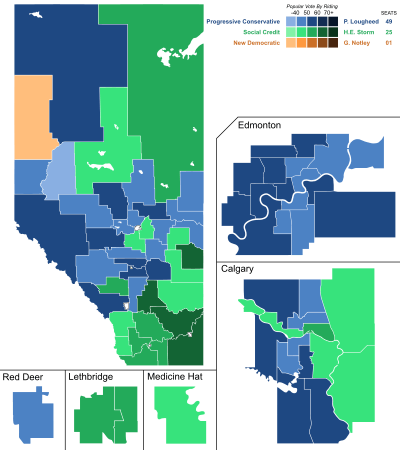1971 Alberta general election
The 1971 Alberta general election was the seventeenth general election in the Province of Alberta, Canada. It was held on August 30, 1971, to elect members of the Legislative Assembly of Alberta.
| |||||||||||||||||||||||||||||||||||||||||||||||||
75 seats in the Legislative Assembly of Alberta 38 seats were needed for a majority | |||||||||||||||||||||||||||||||||||||||||||||||||
|---|---|---|---|---|---|---|---|---|---|---|---|---|---|---|---|---|---|---|---|---|---|---|---|---|---|---|---|---|---|---|---|---|---|---|---|---|---|---|---|---|---|---|---|---|---|---|---|---|---|
| |||||||||||||||||||||||||||||||||||||||||||||||||
 Popular vote by riding. As this is a first-past-the-post election, seat totals are not determined by total popular vote, but instead by results in each riding. | |||||||||||||||||||||||||||||||||||||||||||||||||
| |||||||||||||||||||||||||||||||||||||||||||||||||
Background
The Progressive Conservative Party, led by Peter Lougheed, won a large majority, thereby ending the Social Credit Party's 36-year run in government–one of the longest such runs at the provincial level in Canada at the time. Ernest C. Manning had resigned as Social Credit leader and premier in 1968 after 25 years in office, a year after leading the Socreds to their ninth consecutive majority government. His successor, Harry E. Strom, had been unable to revive a government increasingly seen as tired, complacent and old-fashioined. The Socreds had been in government for almost two generations, having won their first victory more than a decade before oil was found in a big way in Alberta.
The Progressive Conservatives, on the other hand, had significant momentum going into the 1971 election. Over the past four years, their caucus had increased from the six members elected in 1967 to ten, after two MLAs from other parties crossed the floor and the Tories won two by-elections (one in Manning's former riding). The collapse of the other opposition parties made the PCs the only credible challenger to the Socreds. The Tories took 46% of the popular vote and won 49 of the 75 seats in the legislature, enough for a strong majority government. This would be the first of twelve consecutive victories for the PCs; they would remain in government without interruption until their defeat in 2015, making them the longest serving political dynasty in Canadian history.[1] The 1971 election is considered a classic example of a realigning election.
Social Credit garnered a record number of votes in this election compared to previous elections, which had been plagued by low turn-outs. The party lost only a small share of their popular vote from 1967 and finished only five points behind the Tories. However, the Tories converted this slim lead into a large lead in seats due to their success in the province's two largest cities: Edmonton, where the Tories won every seat, and Calgary, where they took all but five. While many of the Social Credit losses came by small margins, those losses were enough to cost the party almost half of its caucus. Strom resigned as Social Credit leader a few months after the defeat.
The defeat sent Social Credit into headlong decline. Its membership in the Assembly shrank over the next ten years and disappeared altogether by 1982.
The Liberal Party was shut out of the legislature. One Liberal, Bill Dickie, had crossed the floor to the PCs. Another, William Switzer, died in 1969. The remaining Liberal, Michael Maccagno, resigned to run, unsuccessfully as it turned out, for the federal Parliament.
Alberta New Democratic Party leader Grant Notley was the only one in his party to win election. He sat as the only New Democrat in the legislature until 1982. His daughter Rachel would lead the NDP to victory over the Tories in 2015, ending its 44 years in office.
A number of electoral districts were redistributed following 1970 amendments to The Elections Act[2] which were informed by the 1968 Report of the Alberta Committee on Redistribution Procedure written by the Special Committee on Redistribution chaired by SoCred member Frederick C. Colborne.[3]
Results
| Party | Party leader | # of candidates |
Seats | Popular vote | |||||
|---|---|---|---|---|---|---|---|---|---|
| 1967 | Elected | % Change | # | % | % Change | ||||
| Progressive Conservative | Peter Lougheed | 75 | 6 | 49 | +717% | 296,934 | 46.40% | +20.40% | |
| Social Credit | Harry E. Strom | 75 | 55 | 25 | -54.5% | 262,953 | 41.10% | -3.5% | |
| New Democrats | Grant Notley | 70 | - | 1 | 73,038 | 11.42% | -4.56% | ||
| Liberal | Bob Russell | 20 | 3 | - | -100% | 6,475 | 1.01% | -9.80% | |
| Independent | 3 | 1 | - | -100% | 462 | 0.07% | -1.31% | ||
| Total | 243 | 65 | 75 | +15.4% | 639,862 | 100% | |||
| Source: Elections Alberta | |||||||||
Daylight saving time plebiscite
Alberta voters also voted in a province-wide plebiscite whether or not to endorse a proposal to adopt daylight saving time (summer time). The proposal had been rejected by a very slim margin in 1967. This time however it passed with a wide margin of 61.37% of the vote.
| Do you favour province-wide daylight saving time? | |||
| For | Against | ||
| 386,846 61.47% | 242,431 38.53% | ||
For break down of results see individual districts
Members elected
For complete electoral history, see individual districts.
See also
- 1948 Electrification Plebiscite
- 1957 Liquor Plebiscite
- 1967 Daylight Saving Plebiscite
- List of Alberta political parties
References
- "Alberta PCs win historic 12th straight majority". CTV Calgary. April 23, 2012. Retrieved May 11, 2012.
- The Election Act, RSA 1970, c. C-117
- Special Committee on Redistribution (1968). Report of the Alberta Committee on Redistribution Procedure. Edmonton, Alberta: Legislative Assembly of Alberta. Retrieved 22 May 2020.